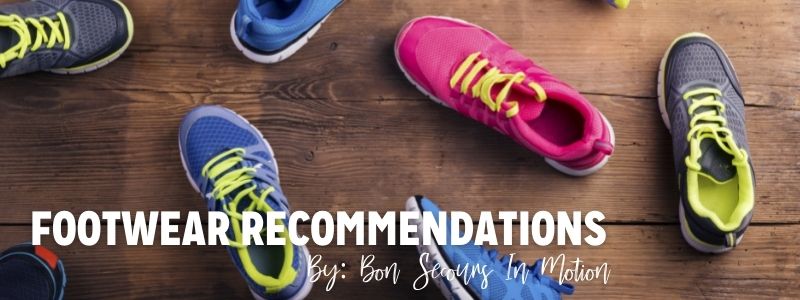We’ve partnered up with our presenting sponsor, Bon Secours, to bring you training trips to help you stay healthy while you training for your next race. A few things should be done to help make sure you are fully prepared for your race! One of them is picking the right running shoes.
Decide the surface you are running on. Options include: Road running, Trail running, Cross Training. Trail running shoes tend to be more durable but also heavier. Cross training shoes allow for some better lateral stability for multi-directional sports.
Decide the level of support you need. This is where a professional like a physical therapist trained in footwear recommendation can help. You will need to assess how much (if any) your arches drop with stance. Its important to be able to do this during running as the forces increase greatly between walking and running. Options include: cushion, stability, control.
Find a brand that works for you. Shoe brands use different lasts, or patterns, for their shoes. Some lasts are a little wider or more narrow in certain parts of the foot and might fit your foot better than others. Try different brands to see which brand tends to fit you best.
Find a shoe that fits. A proper fitting shoe should have a little space from the end of your toe to the end of the shoe. Check this in standing. You should not have any sliding of your heel in the back of the shoe. Check this by holding the back of the shoe and trying to raise your heel, there should be little to no movement.
Decide if you need orthotics. Most runners get the support they need from the proper running shoes. Some runners have special needs due to biomechanical issues and need orthotics in their shoes to supplement the footwear. A physical therapist trained in orthotic fabrication can offer suggestions that may assist.
Don’t change shoes too close to race time. Your shoes should last 400 to 500 miles but also have a shelf life and should probably be replaced 1x per year as the materials ability to absorb shock does break down over time. That being said, don’t get new shoes too close to race time as subtle changes in fit or support might cause issues during a long race.
If you have questions or concerns regarding your footwear, reach out to your local In Motion Physical Therapy partners!
Mike Pishioneri PT, DPT, OCS
Rehab Manager, Physical Therapist
In Motion Town Center













